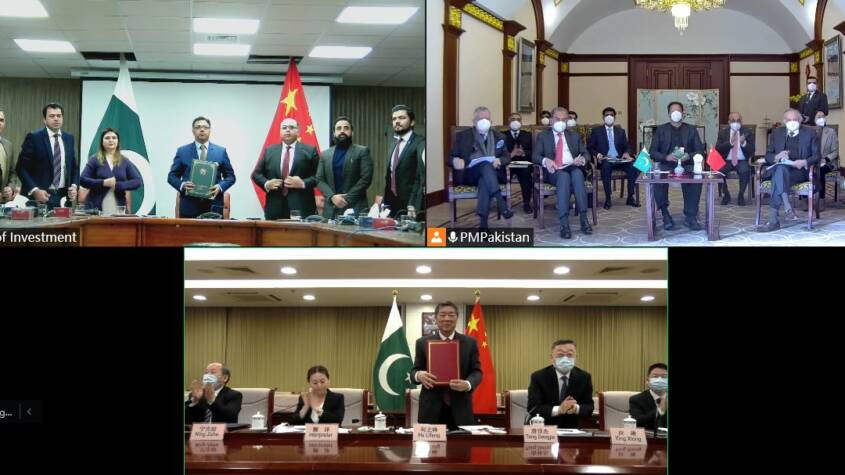Industrial Cooperation Agreement to encourage joint research and development: Ahsan Munir
Ahsan Munir, a Columnist writes that Pakistan and China signed the Framework Agreement on industrial cooperation under the CPEC, during the PM Khan’s recent China visit. He mentioned that the signing of the framework agreement has been hailed by the government as a significant outcome of the Prime Minister’s visit and a top agenda from the Chinese side as a testimony to their interest in CPEC. He highlighted that the framework agreement will improve skill development, enhance labour productivity, and encourage joint research and development. He also said the academia-industrial linkage is minimal, with academia having more theoretical knowledge and at a loss to apply its theoretical knowledge to industrial problems. He urged that CPEC has the potential to kickstart the generation of knowledge in our local academia, which would, among other tangible benefits.
Pakistan and China signed the Framework Agreement on industrial cooperation under the CPEC—a multi-billion-dollar initiative, following the Prime Minister’s recent tour to Beijing. The signing of the framework agreement has been hailed by the government as a significant outcome of the Prime Minister’s visit and a top agenda from the Chinese side as a testimony to their interest in CPEC.
As CPEC entered its second phase, primarily revolving around the development and industrialisation of SEZs, the need for a comprehensive framework became imperative. Through CPEC, Pakistan seeks to enhance industrial competitiveness, increase exports, and sustain diversification in the exports basket. To populate SEZs and attract Chinese investors, the PM held a series of meetings with officials from China’s leading state-owned and private companies.
The framework agreement seeks to improve skill development, enhance labour productivity, and encourage joint research and development. However, the aforementioned improvements need basic infrastructure to be in place in which technology transfer and academia-linkage have an important role to play.
At present, the academia-industrial linkage is minimal, with academia having more theoretical knowledge and at a loss to apply its theoretical knowledge to industrial problems. Similarly, the industry is more inclined to hire consultants from abroad to troubleshoot their problems than taking those problems to academia, which, generally, again struggle with the new technologies adopted by various industries. To compound the problem further, all the universities are trying their hands at everything: in every field and every technology. In the West, we have centuries-old universities which may be awarding degrees in various fields but are centres of excellence in specific fields and technologies. And, consequently, they attract the best minds from around the world in their specialties, which helps these universities increase their kernel of tacit knowledge and, over time, achieve breakthroughs in their specialist fields.
At present, new universities are being set up in all the provinces, while the existing universities are going under expansion to offer more courses and accommodate more students. However, universities need to ask how much these students’ skills are aligned to industrial needs. Thus, there is a need to regulate the proliferation of universities and control the intake of students to these universities. Next, federal and provincial governments, through their respective HECs, need to ask the universities to identify their expertise, and the award of grants to these universities should be based upon the practical achievements against their intended/declared expertise.
At the graduate level, one is introduced to research, while master’s level further exposes to research theories and tools. At the PhD level, comprehensive exposure is given to research theories and tools and the researcher is then required to apply a specific research theory and accompanying tools to a research problem and come out with evidence-based results and conclusions. However, merely acquiring a PhD does not make the person specialist in the field, and thus we see in the West—new PhDs doing jobs as research assistants for a few years to get the necessary training and exposure, before being appointed as regular faculty members.
In the present second phase, the governments at the federal and provincial level should identify the centres of excellence in different universities and they should cooperate with Chinese companies which are setting up industries in various SEZs. This would give our academia valuable experience, and help develop tacit knowledge in their areas of expertise. To help facilitate this cooperation between Chinese investors and our academia, our government should make academic cooperation a part of the recently signed framework agreement.
CPEC has the potential to kickstart the generation of knowledge in our local academia, which would, among other tangible benefits, help it train its students to the needs of the industry and help academia interact with the local industry in a more focused manner.
Chinese Ambassador highlights significance of Third Plenary Session for China-Pakistan cooperation
The Third Plenary Session of the 20th Central Committee of the Communist Party of China ha…











